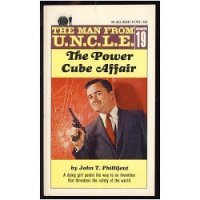The Corfu Affair - Phillifent John T. (хороший книги онлайн бесплатно .TXT) 📗
"A technical advance," the Russian agent said, "but hardly a matter for high-ranking military concern, surely?"
'I warned you it was cockeyed," Hagen said. "Luther, you tell 'em how much those things are worth, will you?"
Dr. de Wet cleared his throat, adjusted his glasses and smiled, but with bewilderment rather than mirth. "The modules are extremely difficult to make. They require vacuum diffusion and zone-melting techniques and a critical standard of performance. We discard about fifty per cent as below standard. So, in that sense, they are valuable. Were it not a military project, the enterprise would not be worth while. But in themselves the modules are useless for anything but the intended purpose. It has been suggested that they might be sold to ham-radio people, but that is not a workable notion. One module is useless without the other or with some circuit precisely tuned to it. It would be like trying to sell a gross of keys, each of which will fit only one lock!"
"They aren't tunable?" Kuryakin asked, and the expert shook his head.
"Not at all. They are difficult to make, hard to replace, but of virtually no value. Why would anyone steal them?"
"That's where I take over." Hagen sat back and crossed one knee over the other. "About a year ago Westaway was broken into. Get the picture right, gentlemen. Fort Westaway is not exactly top security. Radio Research isn't like that. The raiders did more damage than anything else. They stole a few items, among which was a package containing a score, ten pairs, of those modules. As I say, they aren't secret, or precious, just of nuisance value to replace. Maybe a few soldiers will get killed who need not have done, and who cares about that?" Hagen's voice was bitter. "Of course, since the break-in we have posted a guard. For a year! And then, three days ago, repeat. Only this time the intruders knew exactly what to go for, and to get. And we think they got away. They took two packages this time. Nothing else, just two-score units, twenty matched pairs. The thieves were chased. They shot and almost killed the guard sergeant, so the troopers in pursuit weren't exactly tender. They ran a car off the road and the occupants were killed. The fire left practically nothing we could identify, except that we can say there were two people in the car—and a third who got clean away on a motorcycle. We might as well assume while we're at it that the third man got away with the modules. And there you have the crop. You have my word that nobody will break into Westaway again, but that's the well known stable door routine. What we want to know is who, and why. Military Security is working on it, of course, but to be frank with you, it doesn't make sense. If this is the work of a foreign power or an enemy, we can't see it. I think it sounds like something in your line."
Half an hour later, after some questions had been asked and answered, the distinguished guests were conducted safely away, leaving Solo and Kuryakin to sit thoughtfully opposite Waverly.
"It's after the style of Thrush," Kuryakin said thoughtfully. "But I can't see what use those modules would be to anyone. I mean, they would make beautiful walkie-talkie outfits, but why break into a military establishment to steal them when you can make a fair substitute from any radio supplier? Unless there's something we have not been told?"
Waverly sighed. As a rule his appearance was that of an untidy and impractical scholar, a pedagogue setting his students some abstruse problem in delicate reasoning. Now he looked his age, a grim old man.
"We can set in motion the routine enquiries," he said, almost as if talking to himself. "We can increase the surveillance of Thrush laboratories and places of research in the hope that we will get some clue as to what they may intend to do with those modules."
"You're assuming it is Thrush, sir?"
"I am, Mr. Solo, and I will tell you why. But this is a matter to concern only the three of us, for the moment." That simple statement put a chill into the atmosphere of the room. A matter to be kept private to Waverly and his two top agents alone was something quite new in Solo's experience. He exchanged a glance with his colleague and saw the same tense expression of wonder reflected there.
"Allow me what may seem a digression, gentlemen." Waverly touched a switch and spun his chair so that he faced a screen. A picture came crisply into focus, a picture that made the two agents stare in amazement. In glorious color, it was a scene of rugged mountains raising their grey tips out of a mantle of olive green, with here and there scattered patches of a paler green, obviously walnut groves. Coastal cliffs edged the picture and a vivid blue sea sparkled in the foreground. But their eyes were drawn irresistibly to the fantastic stone pile that snuggled against those green slopes. The picture zoomed in suddenly, aiming at the building, and they saw that it was a palace, a towered and spired structure, colonnaded and battlemented, all in white stone and pink woodwork trim. It might have come direct from a Disney production.
A carefully impersonal voice began to recite: "This is the Argyr Palace," it said. "It stands on the island of Corfu some seven miles south of Corfu City. For many years untenanted and in decay, it was purchased some ten years ago by Countess Anne-Marie Louise de St. Denis and renovated. It is now her home for some eight months in every year."
The fairy-tale palace dissolved into a close-up of a face, still in color. "The Countess de St. Denis is thirty-four, of French-Italian descent, has been married four times, is now a widow, is owner and director-controller of the St. Denis Laboratories in Paris."
Solo stared and marveled. Belatedly he remembered that Corfu was Greek, and this was a face to make anyone remember. In some subtle way it failed to match the Palace image. This woman was part Eve, part Aphrodite, with glossy black hair, vivid coloring on a flawless skin, eyes so blue as to be almost black, and a personal magnetism that radiated even from this, a mere picture. Yet, somehow, there was a touch of the Medusa about her too.
Waverly turned to look at his agents. "That woman," he said, "is the most dangerous person alive. That may sound like exaggeration, and I have never before said as much aloud for that very reason. But now I have evidence in proof of my statement. She is a brilliant brain, by any standards. From four marriages she has made money, gained skills, and is deeply involved with the higher council authorities of Thrush Central. This much I know. In addition, she is a skilful cosmetic surgeon in her own right and has a degree of earned fame in that field. But there's nothing she won't turn her hand to. The police and secret services of half a dozen nations would dearly love to be able to pin something on Countess Louise, and make it stick, but she is too clever for that. Take a good look, gentlemen, because we are going to move against her, and it's as well that you know just what you are taking on."
"Do we know anything factual about her, sir?" Kuryakin asked, and Solo echoed that in some wonder.
"I thought I was pretty well acquainted with the big villains of the world," he said. "And in particular the big guns in the Thrush hierarchy, but this lady is news to me."
"As I said." Waverly nodded, "she is extremely clever. She is the power behind the throne always, never out in the open. Think of Corfu for a moment. It's a small island, not too easy to get at. Under Greek rule, a very uneasy government. Corfu City is the only settlement of any size, and it is little more than a town, only about thirty-five thousand people all told. For the rest—villages! Adequate surveillance is impossible in such a setup. Furthermore, the Palace is accessible from the sea, so visitors can come and go virtually at will. Nevertheless I was able to learn that, about a year ago, the Countess was entertaining guests, rather special guests. By twos and threes the top people in Thrush, the Hierarchy, were visiting her, very quietly and discreetly. There was a regular pattern, much too regular to be just coincidence."




